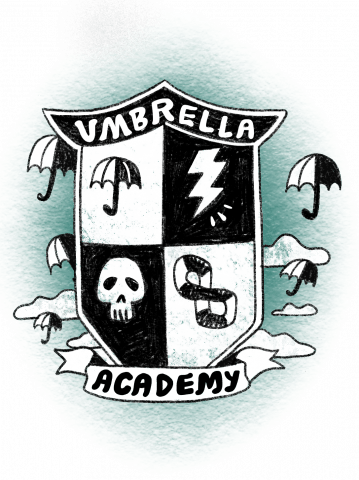
The new high-concept superhero show on Netflix, The Umbrella Academy, is an absolute fever dream and may be the most watchable thing that the streaming giant has ever produced.
The Umbrella Academy is based on an independent comic book created by Gerard Way — yes, the My Chemical Romance guy — and it’s better than it has any right to be. The show follows the Hargreeves family, a team of seven orphans born with inexplicable powers who reconvene as adults to investigate the death of their billionaire patriarch and stop an impending apocalypse.
The characters in The Umbrella Academy are unique in their inventive powers and psychological depths. Each member of the group has a standout design and a fully fleshed-out personality from the start of the series. The team feels timeless, as if they’ve existed as long as the Marvel and DC characters that they draw inspiration from.
Each of the Hargreeves siblings has a notable character hook. Luther struggles with an accident that left him with a mutant gorilla-like body, Klaus struggles with heroin addiction as a way to self-medicate his ability to see the dead, and the time-travelling Number Five is trapped in a child’s body after spending half a decade in a different timeline.
Serving as the audience stand-in amidst these largerthan-life characters is Vanya, played by Ellen Page, who has no discernible ability — aside from orchestral violin — despite being raised as a member of the academy. Page brings real gravitas to the series and an emotional realism to her character that keeps the otherwise ridiculous events of the series grounded in reality.
This is necessary because the plot is insanely ambitious. There are time-travelling assassins, secretive android caretakers and long-gestating conspiracies against the academy. There’s an entire subplot where one of the characters is accidentally transported back to the Vietnam War where he serves an entire tour. Naturally, this happens in between episodes and is only fully explained later.
Others might find this chaotic as the tonal whiplash of all these disparate elements coming together can be a bit much, but I found the frenetic pacing to be addictive. The show never becomes stagnant, revealing new secrets with each passing episode rather than piling up unanswered questions.
Despite its anarchic approach to storytelling, The Umbrella Academy is incredibly well plotted. Each individual character arc pays off by the end of the season even if individual scenes sometimes seem inconsequential. By the final episode, every point of inquiry — aside from a few cliffhangers — is wrapped up in a way that is wholly satisfying.
The visual design of the show is also fantastic. What could have easily come off looking like a bargain-bin Tim Burton rip-off looks more like someone let Wes Anderson direct a Marvel movie. Everything from the practical effects used to create Luther’s towering physical presence to the industry-standard CGI looks incredible.
This sense of style also extends to the set design. Each locale in the series feels otherworldly but oddly familiar. It’s a show that makes a long-forgotten attic or a cluttered apartment look just as visually interesting as its big action set pieces. Locations are treated like characters in The Umbrella Academy, which is an achievement in itself.
I wasn’t expecting to enjoy this show as much as I did, but the mix of somber family drama and high-concept comic-book storytelling absolutely drew me in. Others might find the tone too inconsistent or be thrown off by the tenuous MCR connection, but if you can get past that, there’s nothing quite like The Umbrella Academy.
—
Cole Chretien / Culture Editor
Graphic: Jaymie Stachyruk / Graphics Editor
Leave a Reply